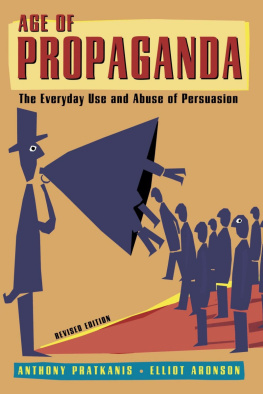Routledge Revivals
The Rape of the Masses
First published in French in 1939, and later in English in 1940, this work by biologist, sociologist and social activist, Serge Chakotin, analyses and strongly critiques the effect of Nazi propaganda on the psychology of the masses. By bringing together the political and the psychological, Chakotin refers to the use of propaganda in order to serve the ends of a handful of men as psychical rape and warns that this phenomenon cannot be attributed solely to the Nazi regime.
The English translation was updated to account for the outbreak of the Second World War in 1939. It will be of great interest to anyone studying the Second World War, Nazism, Fascism and the psychology of propaganda.
The Rape of the Masses
The Psychology of Totalitarian Political Propaganda
Serge Chakotin
Le Viol Des Foules
First published in Paris, 1939
The Rape of the Masses
First published in England, 1940
by George Routledge & Sons, Ltd
This edition first published in 2017 by Routledge
2 Park Square, Milton Park, Abingdon, Oxon, OX14 4RN
and by Routledge
711 Third Avenue, New York, NY 10017
Routledge is an imprint of the Taylor & Francis Group, an informa business
1939 Editions Gallimard
The right of Serge Chakotin to be identified as the author of this work has been asserted by them in accordance with sections 77 and 78 of the Copyright, Designs and Patents Act 1988.
All rights reserved. No part of this book may be reprinted or reproduced or utilised in any form or by any electronic, mechanical, or other means, now known or hereafter invented, including photocopying and recording, or in any information storage or retrieval system, without permission in writing from the publishers.
Publisher's Note
The publisher has gone to great lengths to ensure the quality of this reprint but points out that some imperfections in the original copies may be apparent.
Disclaimer
The publisher has made every effort to trace copyright holders and welcomes correspondence from those they have been unable to contact.
ISBN 13: 978-1-138-09132-0 (hbk)
ISBN 13: 978-1-315-10808-7 (ebk)
ISBN 13: 978-1-138-09133-7 (pbk)
THE RAPE OF THE MASSES
THE PSYCHOLOGY OF TOTALITARIAN POLITICAL PROPAGANDA
By
SERGE CHAKOTIN, D.Sc.
LE VIOL DES FOULES
First published in Paris, 1939
THE RAPE OF THE MASSES
First published in England, 1940
Translated from the Fifth Edition
By E. W. DICKES
To
. G. WELLS
THINKER OF THE FUTURE
The alliance between Science and the workers, which by their union can liberate civilization from every fetterthis is the aim to which I have decided to dedicate my life until my last breath!
FERDINAND LASSALLE, in address on "Science and Labour".
And it must needs be the work, first of all, of an aggressive order of religiously devoted men and women who will try out and establish and impose a new pattern of living upon our race.
Last sentence of . G. WELLS'S "The Shape of Things to Come: the Ultimate Revolution".
Contents
The defeat of the democraciesAims of human cultureThe danger of its destructionThe way outThe revolutionary thesis.
The sciences of manThe place of psychology BehaviourismPavlov and the theory of conditioned reflexesInhibitionIrradiationCerebral localizationsSleepSuggestionThe reflex of purposeThe reflex of libertyCharacters SpeechConsciousnessThe biological bases of the theory" Spectrum analysis " of the soulTrainingEducationPsychiatryPsychology in businessPublicity and advertisingPsychagogy.
Political activityThe psychology of crowdsGustave le BonThe masses and the crowdExamples drawn from the Russian RevolutionThe system of instinctsThe system of human activitiesVicesSublimationFeelingsThe acquisitions of human cultureDegenerationsThe school of FreudThe ideas of AdlerThe doctrines of Marx ChristianityThe succession of great popular movements in history.
StruggleCorporal violencePainMenaceMimicry for terrorizationFearPanicFighting masksThe uniformThe goose-stepDiscipline Military musicEcstasyEnthusiasmCourage Psychology and warMarshal Psychologos.
The characteristic symbolism of our age Gleich-schaltung (the enforcement of conformity)Political symbolsThe fascioThe swastikaThe three arrowsSymbols in printSymbolic salutesSound symbolsThe mythRitesReligious worshipJournalismPrinciples of political propaganda.
Ancient timesGreeceRomeChristianityThe French RevolutionThe Socialist methodsThe war of 191418The secrets of Crewe HouseThe Propaganda ministries-The Russian Revolution.
The Hitlerist phenomenon and its dangersThe distinction between the " 5000 " and the " 55,000 " Popular emotional propaganda and propaganda by persuasion Mein Kampf Mussolini.
The first strokeThe struggle against routine and incomprehensionThe elections in Prussia, and at Wrttemberg and HamburgThe triumph in Hesse A new hope and disappointmentThe plan of the " Seized finger "The tidal waveJuly 20, the Leaders SedanThe semi-victoryIts consequences The collapse.
OriginsThe Saar plebisciteThe remilitarization of the RhinelandThe Abyssinian warBlackmail by the threat of warThe Spanish warThe idea of " total war "The AnschlussCzechoslovakia The crisis of September 1938.
FreedomThe last hours of capitalism-The decline of " Marxism "The downfall of the League of NationsPseudo-pacifismThe reactivation of SocialismThe renewalPolitics, a biological scienceExperimental politicsThe organization of the moral factorThe idea of imposed peace and its propagandaThe pact of collective defence Frances partWhat to do, and how ?Doctrine Persuasive anti-Fascist propagandaConstructive propagandaEmotional popular propagandaThe myth of the French RevolutionThe corresponding symbolsRules for the technical organization of anti-Fascist propaganda.
The awakeningThe conditions of safetyThe antagonism between culture and life biologically healthyThe idea of compensated pessimism.
The defeat of the democracies Aims of human culture The danger of its destruction The way out The revolutionary thesis
IN justification of some recent conquests the dictators contended that they were achieved peacefully, or at least without recourse to physical violence. This is only true in appearance: the absence of war does not prevent the employment of an equally manifest type of violencepsychical violence. Menacing speeches and mobilizationthis was the formula employed by Hitler in September 1938 to produce the capitulation of the old European democracies at Munich: a formula simply and purely of psychical violence.
"We have brought into existence an armed force such as the world has never before seenI can declare it openly now. In these five years I have truly armed. I have expended milliards and equipped our forces with the most modern weapons. We have the best aircraft, the best tanks"such were Hitler's statements in his speech, intended for the ears of the whole world, at the Sports Palace in Berlin on September 27, 1938.
"I have given orders for the erection of gigantic fortresses over against the Maginot Line," he declared in the midst of shouts of acclamation from the Nazi crowd at Nuremberg. "The German forces", "the German sword", and the like have been the continual phrases hurled at us by Germany's master.













